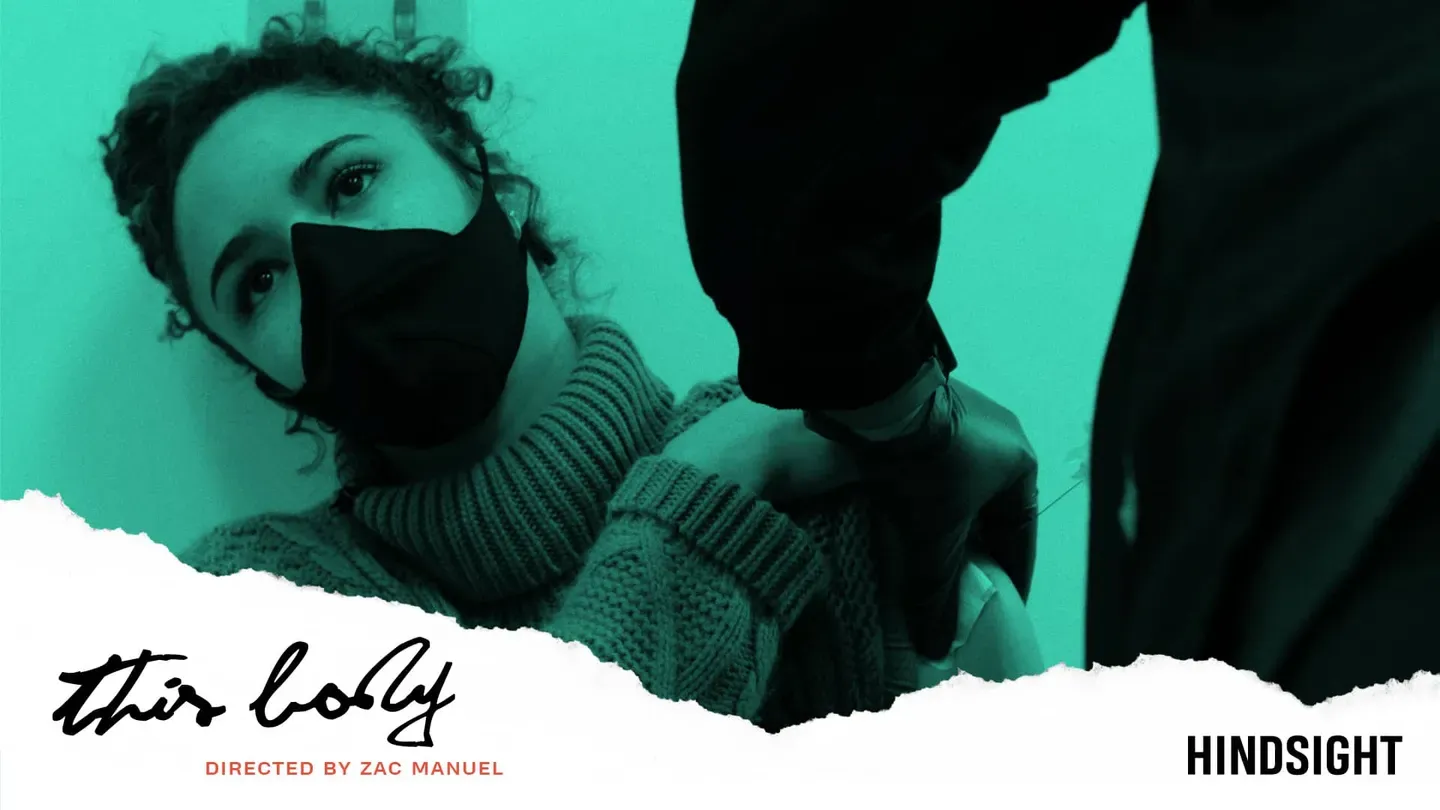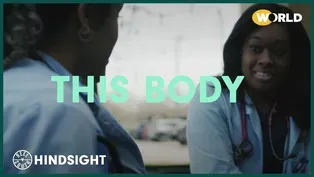

This Body
Special | 13m 28sVideo has Closed Captions
A Black woman enrolls in a COVID vaccine trial to confront the history of medical racism.
This Body explores the fraught relationship between African Americans and the medical industry. As Sydney Hall participates in an experimental coronavirus vaccine trial in hopes of protecting her beloved New Orleans community, she and her loved ones confront the history of medical abuse and experimentation on Black bodies.
Problems with Closed Captions? Closed Captioning Feedback
Problems with Closed Captions? Closed Captioning Feedback
Support for Reel South is made possible by the National Endowment for the Arts, the Center for Asian American Media and by SouthArts.

This Body
Special | 13m 28sVideo has Closed Captions
This Body explores the fraught relationship between African Americans and the medical industry. As Sydney Hall participates in an experimental coronavirus vaccine trial in hopes of protecting her beloved New Orleans community, she and her loved ones confront the history of medical abuse and experimentation on Black bodies.
Problems with Closed Captions? Closed Captioning Feedback
How to Watch REEL SOUTH
REEL SOUTH is available to stream on pbs.org and the free PBS App, available on iPhone, Apple TV, Android TV, Android smartphones, Amazon Fire TV, Amazon Fire Tablet, Roku, Samsung Smart TV, and Vizio.
Providing Support for PBS.org
Learn Moreabout PBS online sponsorship[ambient music] [seabirds crying] [waves splashing] - So I'm going to ask you to look away for me while I give you the vaccination.
I'll disinfect it, give it to you, and then we'll monitor you for those 20 minutes, okay, 30 minutes.
- I was actually wanting to volunteer for a vaccine trial to begin with, because I knew that they would need people, and a lot of people were scared of it.
- [Nurse] And you will feel a small pinch.
Just let me know if you feel anything otherwise, okay?
- People distrust the medical field in general, because of history.
[gentle light music] - If you're black in America, you're twice as likely to die of COVID-19.
Yet researchers are seeing a disproportionately low number of black volunteers for vaccine clinical trials that could save lives.
- Because of Tuskegee, because of what happened.
- [Man] The United States Public Health Service conducted a study beginning in 1932 that involved deliberately withholding treatment from a group of 400 black men who were afflicted with syphilis.
- [Man] Well people are afraid, they think about Tuskegee, and I understand all of that, but there have to be some people to make sure that it works for everybody.
- We don't want to find out, surprise, there's a side effect in African-America that you've not noticed.
- [Man] Among some 360,000 study volunteers so far, just 40,000 minorities.
- People were like, "Well I don't trust being a Guinea pig," and crazy stuff like, "Oh well, "it's survival of the fittest and Darwinism."
And it just goes back to well, don't you care about those who can't protect themselves?
I have a little bit more experience, and I have a little more trust, because I'm in the medical field myself.
I'm still feeling like it's going to be a euthanasia case though, because of what lab we had planned.
Trying a new vaccine for people is really scary, but since I feel okay about it, I think that I should be one to get involved, and hopefully other people would think that way as well.
[upbeat music] You might be okay with peanut butter?
Peanut butter, look at that.
Is our exam at eight tomorrow?
- I think the anesthesia machine is going to be on there.
I'm thinking that they're going to have pictures, and they're gonna like, "Tell us what this is, or "What does it do?"
Or, "If you disconnect this, what is it?"
My first thought when I hear trial is, the syphilis study that they did at Tuskegee back in 1932.
Why did they go to the poorest community in the whole state of Alabama?
Why did they only test all black people?
- I don't know, there's definitely, it's always in the back of your head, like, I don't know if I like completely trust you, but at the same time, this is the one thing that I could see as a means to, some kind of aid, hopefully we'll see.
- Okay, the syphilis thing was 1932, but look at today's time.
Black people are not given the proper medical treatment as everybody else.
The Black Lives Matter Movement and this pandemic do tie into each other, and I feel like the doctors play the same role as the police do, just in different settings.
You really control life or death for me right now, and it's a matter of, do you see me as something or someone that's easily disposable?
Or are you going to treat me with the same equal value that you would if it were someone else?
It's a tough situation, because we want a vaccine.
We want change, we want this to go away.
- Yeah.
- But at the same time, I don't want myself or my family to be, you know.
- To get any harm from it?
- Hm-mm.
- These are all of us.
I think we look just alike.
- During my pregnancy, I was having such trouble with my blood pressure until I was going to the doctor, went to the hospital, like once a week.
And then when I did go into labor, I stayed in labor for 18 hours.
The doctor did not want to come.
He was saying, "Oh, she's okay, "I'll be up there in the morning.
"She should hold on 'til the morning.
So until they lost the heartbeat, and they had to rush me into emergency surgery, then he come, and doctor, he put both me and my child into danger.
- When I talked to her about it, I was like, "Is that a lot of the reason "why you only had one child?"
I'm an only child, she never had another child.
And she said, "Yeah," she said the doctor wanted to tie her tubes, well, burn her tubes right then and there soon as they pulled me out of the C-section, but that's a lot of our bond, knowing that I will always be her only one child, so.
[telephone ringing] - Hey Mama.
- [Barbara] Hey Syd.
- Hey, what are you doing?
- [Barbara] I was just watching the news, no big deal, how are you?
- I'm good, how are you doing?
- [Barbara] Not bad.
- I told mom and dad, so I thought it's probably a good time to tell you that I am involved in the Coronavirus vaccine trials.
- [Barbara] Oh, cool.
- Yeah, I started about a month and a half ago.
- [Barbara] Oh did you?
- Yeah.
[laughing] - [Barbara] Okay, cool.
That's great that you're doing that.
Somebody has to try it, you know?
- Yeah.
- I feel like I've been doing, well, probably we all have been doing a whole lot of waiting, waiting for them to make a vaccine, waiting for the government to give us some direction, waiting around while more and more people get sick, waiting for the future.
- They just keep talking about how we've died from it at higher rates than people, but they don't address the underlying issue of why.
I feel like they're getting more discreet with the medical neglect, but it hasn't changed.
It's just the way they go about it has changed.
- [Newscaster] Some hopeful news.
In just a few weeks the FDA is expected to approve the first vaccines for COVID-19.
- [Woman] The vaccines will be limited at first.
- Come here, let's go for a walk.
[dog barks] This whole time, I've been a little bit more concerned about others, because I have grandparents and I have people who are immune-compromised in my life, so I know that they're vulnerable.
Not that I don't think I wouldn't have symptoms, but I think I'm less likely to die from this.
Guess what's happening tomorrow.
- Besides the test?
- Besides, yeah.
Tomorrow's a big day for me, okay, but I have the test, and then at 12, I have my unblinding for the trial or whatever.
- [Kierra] Unblinding.
- So that's like, they let you know if you - [Kierra] Were the placebo, or you got the-- - Yeah, so they let you know if you got the placebo or you got the actual vaccine and then if you didn't get the actual vaccine, they give you the vaccine, your first dose that day.
- [Woman] All righty, so here comes the fun part, all right.
How are you today?
- Good.
- [Woman] Awesome.
- Excited.
[laughing] - Right, no, this is always an exciting day, with the unblinding, you get to see whether you're on placebo or the actual drug.
- Been waiting for this day a long time.
- [Woman] Just the first two.
- Cool.
- [Woman] All right, so I'm just going to sign just as a witness.
- [Sydney] Cool.
Thank you for witnessing me.
- Yes, it is another day of history for the United States, for the world in general.
- Hm-mm.
[machine beeping] [suspenseful music] [sea birds crying] Alrighty.
- [Man] You wanna hear it?
- Ah, yes, give it to me straight.
- [Man] You got the placebo.
- Aww!
[people laughing] - Now you gotta get a shot.
At least you're one of the ones who's going to get it.
- [Sydney] Nice.
- A lot of people out there can't.
- [Sydney] Why can't they?
- Huh?
- Why can't they?
- [Man] 'Cause they don't qualify for it yet.
[both speaking] So you're doing well.
- [Woman] Little stick.
- [Barbara] I told Ralph the other day, I said, I think when this thing is all said and done, we're going to have some close friends and relatives that's gonna, they'll die of the Covid.
And it's not because of anything we do, and I wish the day comes when, and it may not ever come, we may be like this for a while, we don't ever know how these drugs are going to work, hopefully they're going to work okay.
- [Sydney] Yeah.
- [Woman] But if not, it might be a way of life for us.
But if it's not, I can't wait for the time that I can hug my family.
[gentle quiet music] - Hey baby [laughing] - Long time no see.
- I know [laughing] Look, it's still a short hug.
- I know, I'm like...
So how are you feeling now that you got your vaccine?
- Let me tell you: mentally, I'm comfortable, but to be honest with you, I don't think I'll ever be 100% comfortable.
- Yeah.
Can we end up at the beach if I just go this way?
- My car is full of sand, yeah, but it's just so-- - I feel like you always have an option to be afraid, because I'm afraid, I'm afraid of all the side effects too.
So you kind of have to choose, okay, am I just going to be afraid and just let people keep dying?
Or, am I gonna put my fears aside for a second?
[ocean waves splashing] [gentle piano music] ♪
Two Friends Discuss the Roots of Vaccine Hesitancy
Video has Closed Captions
Clip: Special | 53s | Two friends layout the roots of distrust and the legacy of racism in medical research. (53s)
Providing Support for PBS.org
Learn Moreabout PBS online sponsorshipSupport for PBS provided by:
Support for Reel South is made possible by the National Endowment for the Arts, the Center for Asian American Media and by SouthArts.












